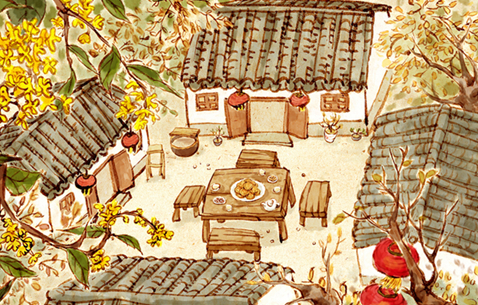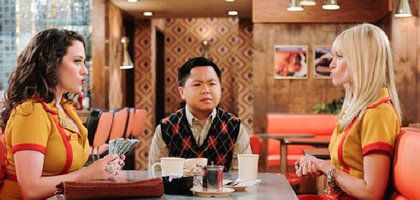嘉莉妹妹(Sister Carrie) 第十七章
|
Chapter 17 A GLIMPSE THROUGH THE GATEWAY: HOPE LIGHTENS THE EYE The, to Carrie, very important theatrical performance was to take place at the Avery on conditions which were to make it more noteworthy than was at first anticipated. The little dramatic student had written to Hurstwood the very morning her part was brought her that she was going to take part in a play. "I really am," she wrote, feeling that he might take it as a jest; "I have my part now, honest, truly." Hurstwood smiled in an indulgent way as he read this. "I wonder what it is going to be? I must see that." He answered at once, making a pleasant reference to her ability. "I haven't the slightest doubt you will make a success. You must come to the park to-morrow morning and tell me all about it." Carrie gladly complied, and revealed all the details of the undertaking as she understood it. "Well," he said, "that's fine. I'm glad to hear it. Of course, you will do well, you're so clever." He had truly never seen so much spirit in the girl before. Her tendency to discover a touch of sadness had for the nonce disappeared. As she spoke her eyes were bright, her cheeks red. She radiated much of the pleasure which her undertakings gave her. For all her misgivings -- and they were as plentiful as the moments of the day -- she was still happy. She could not repress her delight in doing this little thing which, to an ordinary observer, had no importance at all. Hurstwood was charmed by the development of the fact that the girl had capabilities. There is nothing so inspiring in life as the sight of a legitimate ambition, no matter how incipient. It gives colour, force, and beauty to the possessor. Carrie was now lightened by a touch of this divine afflatus. She drew to herself commendation from her two admirers which she had not earned. Their affection for her naturally heightened their perception of what she was trying to do and their approval of what she did. Her inexperience conserved her own exuberant fancy, which ran riot with every straw of opportunity, making of it a golden divining rod whereby the treasure of life was to be discovered. "Let's see," said Hurstwood, "I ought to know some of the boys in the lodge. I'm an Elk myself." "Oh, you mustn't let him know I told you." "That's so," said the manager. "I'd like for you to be there, if you want to come, but I don't see how you can unless he asks you." "I'll be there," said Hurstwood affectionately. "I can fix it so he won't know you told me. You leave it to me." This interest of the manager was a large thing in itself for the performance, for his standing among the Elks was something worth talking about. Already he was thinking of a box with some friends, and flowers for Carrie. He would make it a dress-suit affair and give the little girl a chance. Within a day or two, Drouet dropped into the Adams Street resort, and he was at once spied by Hurstwood. It was at five in the afternoon and the place was crowded with merchants, actors, managers, politicians, a goodly company of rotund, rosy figures, silk-hatted, starchy-bosomed, beringed and bescarfpinned to the queen's taste. John L. Sullivan, the pugilist, was at one end of the glittering bar, surrounded by a company of loudly dressed sports, who were holding a most animated conversation. Drouet came across the floor with a festive stride, a new pair of tan shoes squeaking audibly at his progress. "Well, sir," said Hurstwood, "I was wondering what had become of you. I thought you had gone out of town again." Drouet laughed. "If you don't report more regularly we'll have to cut you off the list." "Couldn't help it," said the drummer, "I've been busy." They strolled over toward the bar amid the noisy, shifting company of notables. The dressy manager was shaken by the hand three times in as many minutes. "I hear your lodge is going to give a performance," observed Hurstwood, in the most offhand manner. "Yes, who told you?" "No one," said Hurstwood. "They just sent me a couple of tickets, which I can have for two dollars. Is it going to be any good?" "I don't know," replied the drummer. "They've been trying to get me to get some woman to take a part." "I wasn't intending to go," said the manager easily. "I'll subscribe, of course. How are things over there?" "All right. They're going to fit things up out of the proceeds." "Well," said the manager, "I hope they make a success of it. Have another?" He did not intend to say any more. Now, if he should appear on the scene with a few friends, he could say that he had been urged to come along. Drouet had a desire to wipe out the possibility of confusion. "I think the girl is going to take a part in it," he said abruptly, after thinking it over. "You don't say so! How did that happen?" "Well, they were short and wanted me to find them some one. I told Carrie, and she seems to want to try." "Good for her," said the manager. "It'll be a real nice affair. Do her good, too. Has she ever had any experience?" "Not a bit." "Oh, well, it isn't anything very serious." "She's clever, though," said Drouet, casting off any imputation against Carrie's ability. "She picks up her part quick enough." "You don't say so!" said the manager. "Yes, sir; she surprised me the other night. By George, if she didn't." "We must give her a nice little send-off," said the manager. "I'll look after the flowers." Drouet smiled at his good-nature. "After the show you must come with me and we'll have a little supper." "I think she'll do all right," said Drouet. "I want to see her. She's got to do all right. We'll make her," and the manager gave one of his quick, steely half-smiles, which was a compound of good-nature and shrewdness. Carrie, meanwhile, attended the first rehearsal. At this performance Mr. Quincel presided, aided by Mr. Millice, a young man who had some qualifications of past experience, which were not exactly understood by any one. He was so experienced and so business-like, however, that he came very near being rude -- failing to remember, as he did, that the individuals he was trying to instruct were volunteer players and not salaried underlings. "Now, Miss Madenda," he said, addressing Carrie, who stood in one part uncertain as to what move to make, "you don't want to stand like that. Put expression in your face. Remember, you are troubled over the intrusion of the stranger. Walk so," and he struck out across the Avery stage in a most drooping manner. Carrie did not exactly fancy the suggestion, but the novelty of the situation, the presence of strangers, all more or less nervous, and the desire to do anything rather than make a failure, made her timid. She walked in imitation of her mentor as requested, inwardly feeling that there was something strangely lacking. "Now, Mrs. Morgan," said the director to one young married woman who was to take the part of Pearl, "you sit here. Now, Mr. Bamberger, you stand here, so. Now, what is it you say?" "Explain," said Mr. Bamberger feebly. He had the part of Ray, Laura's lover, the society individual who was to waver in his thoughts of marrying her, upon finding that she was a waif and a nobody by birth. "How is that -- what does your text say?" "Explain," repeated Mr. Bamberger, looking intently at his part. "Yes, but it also says," the director remarked, "that you are to look shocked. Now, say it again, and see if you can't look shocked." "Explain!" demanded Mr. Bamberger vigorously. "No, no, that won't do! Say it this way -- explain." "Explain," said Mr. Bamberger, giving a modified imitation. "That's better. Now go on." "One night," resumed Mrs. Morgan, whose lines came next, "father and mother were going to the opera. When they were crossing Broadway, the usual crowd of children accosted them for alms-" "Hold on," said the director, rushing forward, his arm extended. "Put more feeling into what you are saying." Mrs. Morgan looked at him as if she feared a personal assault. Her eye lightened with resentment. "Remember, Mrs. Morgan," he added, ignoring the gleam, but modifying his manner, "that you're detailing a pathetic story. You are now supposed to be telling something that is a grief to you. It requires feeling, repression, thus: 'The usual crowd of children accosted them for alms.'" "All right," said Mrs. Morgan. "Now, go on." "As mother felt in her pocket for some change, her fingers touched a cold and trembling hand which had clutched her purse." "Very good," interrupted the director, nodding his head significantly. "A pickpocket! Well!" exclaimed Mr. Bamberger, speaking the lines that here fell to him. "No, no, Mr. Bamberger," said the director, approaching, "not that way. 'A pickpocket -- well?' so. That's the idea." "Don't you think," said Carrie weakly, noticing that it had not been proved yet whether the members of the company knew their lines, let alone the details of expression, "that it would be better if we just went through our lines once to see if we know them? We might pick up some points." "A very good idea, Miss Madenda," said Mr. Quincel, who sat at the side of the stage, looking serenely on and volunteering opinions which the director did not heed. "All right," said the latter, somewhat abashed, "it might be well to do it." Then brightening, with a show of authority, "Suppose we run right through, putting in as much expression as we can." "Good," said Mr. Quincel. "This hand," resumed Mrs. Morgan, glancing up at Mr. Bamberger and down at her book, as the lines proceeded, "my mother grasped in her own, and so tight that a small, feeble voice uttered an exclamation of pain. Mother looked down, and there beside her was a little ragged girl." "Very good," observed the director, now hopelessly idle. "The thief!" exclaimed Mr. Bamberger. "Louder," put in the director, finding it almost impossible to keep his hands off. "The thief!" roared poor Bamberger. "Yes, but a thief hardly six years old, with a face like an angel's. 'Stop,' said my mother. 'What are you doing?' "'Trying to steal,' said the child. "'Don't you know that it is wicked to do so?' asked my father. "'No,' said the girl, 'but it is dreadful to be hungry.' "'Who told you to steal?' asked my mother. "'She -- there,' said the child, pointing to a squalid woman in a doorway opposite, who fled suddenly down the street. 'That is old Judas,' said the girl." Mrs. Morgan read this rather flatly, and the director was in despair. He fidgeted around, and then went over to Mr. Quincel. "What do you think of them?" he asked. "Oh, I guess we'll be able to whip them into shape," said the latter, with an air of strength under difficulties. "I don't know," said the director. "That fellow Bamberger strikes me as being a pretty poor shift for a lover." "He's all we've got," said! Quincel, rolling up his eyes. "Harrison went back on me at the last minute. Who else can we get?" "I don't know," said the director. "I'm afraid he'll never pick up." At this moment Bamberger was exclaiming, "Pearl, you are joking with me." "Look at that now," said the director, whispering behind his hand. "My Lord! what can you do with a man who drawls out a sentence like that?" "Do the best you can," said Quincel consolingly. The rendition ran on in this wise until it came to where Carrie, as Laura, comes into the room to explain to Ray, who, after hearing Pearl's statement about her birth, had written the letter repudiating her, which, however, he did not deliver. Bamberger was just concluding the words of Ray, "I must go before she returns. Her step! Too late," and was cramming the letter in his pocket, when she began sweetly with: "Ray!" "Miss -- Miss Courtland," Bamberger faltered weakly. Carrie looked at him a moment and forgot all about the company present. She began to feel the part, and summoned an indifferent smile to her lips, turning as the lines directed and going to a window, as if he were not present. She did it with a grace which was fascinating to look upon. "Who is that woman?" asked the director, watching Carrie in her little scene with Bamberger. "Miss Madenda," said Quincel. "I know her name," said the director, "but what does she do?" "I don't know," said Quincel. "She's a friend of one of our members." "Well, she's got more gumption than any one I've seen here so far -- seems to take an interest in what she's doing." "Pretty, too, isn't she?" said Quincel. The director strolled away without answering. In the second scene, where she was supposed to face the company in the ball-room, she did even better, winning the smile of the director, who volunteered, because of her fascination for him, to come over and speak with her. "Were you ever on the stage?" he asked insinuatingly. "No," said Carrie. "You do so well, I thought you might have had some experience." Carrie only smiled consciously. He walked away to listen to Bamberger, who was feebly spouting some ardent line. Mrs. Morgan saw the drift of things and gleamed at Carrie with envious and snapping black eyes. "She's some cheap professional," she gave herself the satisfaction of thinking, and scorned and hated her accordingly. The rehearsal ended for one day, and Carrie went home feeling that she had acquitted herself satisfactorily. The words of the director were ringing in her ears, and she longed for an opportunity to tell Hurstwood. She wanted him to know just how well she was doing. Drouet, too, was an object for her confidences. She could hardly wait until he should ask her, and yet she did not have the vanity to bring it up. The drummer, however, had another line of thought to-night, and her little experience did not appeal to him as important. He let the conversation drop, save for what she chose to recite without solicitation, and Carrie was not good at that. He took it for granted that she was doing very well and he was relieved of further worry. Consequently he threw Carrie into repression, which was irritating. She felt his indifference keenly and longed to see Hurstwood. It was as if he were now the only friend she had on earth. The next morning Drouet was interested again, but the damage had been done. She got a pretty letter from the manager, saying that by the time she got it he would be waiting for her in the park. When she came, he shone upon her as the morning sun. "Well, my dear," he asked, "how did you come out?" "Well enough," she said, still somewhat reduced after Drouet. "Now, tell me just what you did. Was it pleasant?" Carrie related the incidents of the rehearsal, warming up as she proceeded. "Well, that's delightful," said Hurstwood. "I'm so glad. I must get over there to see you. When is the next rehearsal?" "Tuesday," said Carrie, "but they don't allow visitors." "I imagine I could get in," said Hurstwood significantly. She was completely restored and delighted by his consideration, but she made him promise not to come around. "Now you must do your best to please me," he said encouragingly. "Just remember that I want you to succeed. We will make the performance worth while. You do that now." "I'll try," said Carrie, brimming with affection and enthusiasm. "That's the girl," said Hurstwood fondly. "Now, remember," shaking an affectionate finger at her, "your best." "I will," she answered, looking back. The whole earth was brimming sunshine that morning. She tripped along, the clear sky pouring liquid blue into her soul. Oh, blessed are the children of endeavour in this, that they try and are hopeful. And blessed also are they who, knowing, smile and approve. 第十七章 初窥门径:希望之光 对嘉莉来说至关重要的这场戏要在阿佛莱礼堂上演。某些情况使得这场演出比原来预料的要引人注目。那个戏剧界的小学生收到台词的第二天早晨就写信告诉赫斯渥,她将在一个戏里演一个角色。“真的,”她写道,生怕他以为她是在开玩笑,“我真要演戏。说实话,我的台词也拿到手了。这是千真万确的。”赫斯渥读到这里,露出溺爱的微笑。 “不知道会演成个什么样子。我一定要去瞧瞧。”他马上回了信,很讨人喜欢地提到了她的演戏才华。“我毫不怀疑你会成功。你明天早上一定要到公园来,把一切告诉我。”嘉莉很高兴地来赴约,把她所知道的一切和演戏有关的细节都告诉了他。 “嘿,”他说,“这太好了,我听了真高兴。你当然会演好的,你人那么灵气。”他确实从没见过她像现在这样神采飞扬。她往日那种淡淡的忧伤现在一扫而空了。她说话时眼睛在闪光,脸蛋红朴朴的,浑身洋溢着演戏给她带来的欢乐。尽管她有种种担心--这些担心时时萦绕心头--她仍然感到兴奋。尽管在一般人眼里这事情无足轻重,她却无法克制她的快乐情绪。 赫斯渥看到嘉莉显露的才华不禁着了迷。在生活中再没有比看到正当的雄心更让人振奋的事了,不管这种雄心多么幼稚。这雄心赋予人以色彩,力量和美感。 神圣的灵感使嘉莉变得神采奕奕。她还没做什么事,她的两个情人已经对她大加夸赞了。他们既然爱她,她所做的事在他们眼里当然就变得很了不起,值得大肆赞扬了。她则由于年轻无知充满着幻想。这些幻想一遇机会就会泛滥起来,于是一个小小的机会就好像成了金色的魔杖,可以用来发掘生活的宝藏。 “让我想想,”赫斯渥说,“我在那个支部该有些熟人。我自己也是兄弟会的会员。”“唉呀,你千万别让他知道是我告诉你的。”“好吧,就按你说的去做,”那个经理说。 “你如果想来的话,我会很高兴的。不过我不知道你怎么能去看演出,除非他邀请你。”“我一定会来的,”赫斯渥多情地说,“我会安排好,这样他不会知道是你告诉我的。这事就交给我好了。”这位经理对演出发生了兴趣,这事本身就非同小可。因为他在兄弟会里地位显要,值得一提。他已经在打算要邀些朋友去订一个包厢,向嘉莉献花。他要让这场演出成为一个社交盛会,给这个小姑娘一个露脸的机会。 隔了一两天,杜洛埃顺路来到亚当街上这家酒楼。他刚到,赫斯渥就看到了。当时是下午5点,酒馆里挤满了商人、演员、经理、政客。满厅是脸色红润大腹便便的人群,都戴着丝礼帽,穿着浆过的衬衫,手上戴着戒指,领带上别着饰针,真是尽善尽美,无可挑剔。那个著名的拳击家约翰·沙立文正站在酒柜的一端,周围站着许多服装鲜艳的运动员,他们正在热烈交谈。杜洛埃迈着大步,满面春风地穿过大厅,脚上那双黄褐色的新皮鞋走起路来发出喀嚓喀嚓的响声。 “嘿,老兄,”赫斯渥说,“我正在想你最近怎么样了。我以为你又出门去了呢。”杜洛埃笑了起来。 “你如果不经常来报到,当心我们要把你除名了。”“实在没办法,”推销员说,“我一直很忙。”他们穿过那些走来走去大声说笑的名人们,慢慢朝酒柜踱去。在3分钟里,这个穿着讲究的经理就三次和人握手。 “我听说你们支部要演一场戏,”赫斯渥以漫不经心的口气说道。 “是啊,谁告诉你的?” “没人告诉我,”赫斯渥说。“他们给我送了两张票来,要我掏两块钱。有没有可以看的东西?”“我也不知道,”推销员答道,“他们一直要我给他们物色个姑娘演个角色。”“我原来不打算去的,”经理随随便便地说,“当然票是要认购的。那边的事情怎么样?”“不赖。他们要靠演出的收入布置装潢一下。”“好,我祝他们旗开得胜,”那位经理说,“再来一杯吗?”他不打算再谈下去了。现在如果他和几个朋友一起在戏院露面,他可以说是他的朋友怂恿他来的。杜洛埃想到该澄清一下可能造成的误会。 “我想我那位姑娘将在戏里串演个角色,”他想了一下突然说道。 “真的?怎么会呢?” “你知道,你们缺演员,要我给他们找一个。我告诉了嘉莉,她似乎想试试。”“那太棒了,”经理说。"这事确实太妙了。对她也有好处。 她以前演过戏吗?” “一点没有。” “嗯,这也没什么关系。” “不过她非常聪明,”杜洛埃不容别人对嘉莉的能力有任何怀疑,于是说道,“她学习她的台词非常快。”“真的吗!”经理说。 “是啊,老兄,那天晚上她让我大吃一惊。真的,我真是大吃一惊。”“我们要给她来个小小的表示,”经理说,“我来准备鲜花。”杜洛埃对他的好心报以微笑。 “演出结束以后,你们一定要和我一起吃点夜宵。”“我想她一定会演好的。”“我要看看她演出。她一定要演好。我们会让她成功的。”经理说着脸上闪过一丝不动声色的微笑,透着善意和精明。 在此期间,嘉莉参加了第一次排演。排演由昆塞尔先生主持,一个年轻人米勒斯先生给他当助手。米勒斯过去在演艺圈干过,有一点资历了,不过究竟有些什么资历旁人就不清楚了。可是,他因为自己有点经验,又摆出一副公事公办的面孔,所以他的态度几近粗暴--事实上,他忘记了自己指导的只是一群业余演员,并不是领工资的下属。 “听着,麦登达小姐,”他对站在台上不知所措的嘉莉说,“你不要这么站着,脸上带点儿表情。记住,你现在要做出有生人打扰心烦意乱的表情。你要这么走,”他说着做出几乎垂头丧气的样子走过阿佛莱礼堂的舞台。 嘉莉并不喜欢他的这个提示。但是这种场面太新奇,又有那么多陌生人在场,每人多少有点紧张,再加上她竭力想避免演砸,这一切使她胆怯起来,不敢提出反对意见。她照着导演的要求走动着,心里却感到这么走缺少了点什么东西,令人不自在。 “喂,莫根太太,”导演又对演珍珠的那个少妇说,“你坐在这里。喂,班贝格先生,你站在这里,这样站。你的台词是什么?”“你要解释清楚,”班贝格先生有气无力地念着台词。他演的是罗拉的情人雷埃,一个公子哥儿,当他发现罗拉嫣然一身,出身低微时,他娶她的决心就动摇了。 “怎么回事?你的脚本是怎么说的?” “你要解释清楚,”班贝格先生紧张地看着他的台词又重复了一遍。 “不错,是这句词,”导演说,“但是脚本上还说你要做出大吃一惊的样子。你再来一遍,看能不能做出震惊的模样。”“你要解释清楚!”班贝格先生有力地命令说。 “不对,不对,这样说不行!你要这么说--‘你要解释清楚。'”“你要解释清楚。”班贝格先生有点走样地模仿着。 “这样好一些了。现在继续往下排。” “有一天晚上,”接下来是莫根太太的台词,于是她就接了上来,“爸妈去看歌剧。他们在百老汇过马路时,一群马路上常见的乞儿向他们乞讨--”“等一等,”导演伸着一个胳膊冲上来说,“你刚才念的台词里,感情还要强烈些。”莫根太太的神气好像是害怕他会动手打她,她的眼里流露出恚怒的神色。 “记住,莫根太太,”他继续说,没有理会她恼怒的眼光,不过态度放和气了一些,“你现在正讲的是一个凄惨的故事。你所说的是件让你伤心的事。这需要注入感情,一种压抑的伤心。要这么说,‘马路上常见的乞儿向他们乞讨。'”“好吧,“莫根太太说。 “好,继续排下去。” “母亲在口袋里掏零钱时,她的手碰到一个冰冷颤抖的手,这只手正抓住了她的钱包。”“很好,”导演打断了她,意味深长地点着头。 “噢!一个小偷!”班贝格先生把该他念的台词叫了出来。 “不对不对,班贝格先生,”导演走近来说,“不是这样说。 ‘噢,是个小偷?'你要这么说。对,就是这样。”“这样好不好,”嘉莉意识到剧团的各个演员连台词还不一定记住了,更别说注意到细微的表情了,就怯生生地提议说,“我们先来通一遍台词,看看每个人是否记熟了。也许通台词的过程中会有所启发。”“这主意不错,麦登达小姐,”昆塞尔先生说,他坐在舞台一边,安详地看着排演,有时也提些意见,但是导演不予理睬。 “好吧,”导演有点窘迫地说,“这样也好。”不过他马上又神气起来,用权威的口气说:“现在我们就通一遍。念的时候,尽量把感情放进去。”“好,”昆塞尔先生说。 “这只手,”莫根太太继续念下去,抬头看了眼班贝格先生,又低头看了眼脚本,“我母亲一把抓住了。她抓得那么紧,一个细细的声音发出一声痛苦的尖叫。妈低下头,看见身旁是个衣衫破烂的小女孩。”“很好,”现在没事可干的导演评价说。 “是个贼!”班贝格先生叫了起来。 “响一点,”导演插嘴说,发现自己简直没法撒手不管。 “是个贼!”可怜的班贝格吼了起来。 “不错,是个贼,但是这个贼几乎还不到6岁,长着一张天使般的脸。'住手,'妈说,'你想干什么?’”“'想偷钱,'那个孩子说。”“'你难道不知道这么做不对吗?'我爸问。”“'不知道,'那孩子说,'但是挨饿是很难受的。'”“'谁叫你偷的?'我妈问。”“'是她--在那里,'孩子说,手指着路对面门洞里一个邋遢的女人。那女人猛地顺马路逃了。'那就是老犹大,'小女孩说。”莫根太太读这一大段时,语气平淡,导演简直绝望了。他坐立不安地转来转去,然后朝昆塞尔先生走去。 “你觉得他们怎么样?”他问。 “嗯,我看我们可以把他们训练得像个样子。”昆塞尔先生回答,露出一副百折不回的神气。 “我可没有把握,”导演说。“我看班贝格这家伙演情人实在太糟了。”“我们找不到别人了,”昆塞尔先生翻着眼睛说,"哈列生临时变卦不演了,我们还能找谁呢?”“我不知道,”导演说。“我恐怕他永远学不会。”就在这时班贝格先生叫了起来:“珍珠,你在和我开玩笑。”“你瞧瞧,”导演用一只手捂着嘴说,“上帝啊,像这样一个说话拖腔的人,你能拿他怎么办呢?”“尽你所能吧,”昆塞尔安慰地说。 排演就这样继续下去,直到嘉莉扮演的罗拉走进房间向雷埃解释。听了珍珠的说明以后,他已经写了一封绝交信,不过信还没有寄出。班贝格正在结束雷埃的台词:“我必须在她回来之前离开。啊,她的脚步声!太迟了!”他正慌慌张张地把信往口袋里塞,她温柔地说话了:“雷埃!”“柯--柯脱兰小姐,”班贝格结结巴巴地轻声说。 嘉莉看了他一会儿,忘记了周围的这些人。她开始把握自己扮演的角色的心理,嘴上露出一丝淡漠的微笑,按照台词的指示转过身来,朝窗子走去,就好像他不在场似的。她这么做的时候,姿态是那么优美,让人看了着迷。 “那个女人是谁啊?”导演一边看着嘉莉和班贝格的那场戏,一边问。 “麦登达小姐,”昆塞尔说。 “我知道她的名字,”导演说,“但是她是干什么的呢?”“我不知道,”昆塞尔说。“她是我们一个会员的朋友。”“嗯,我看她在这些人中最有主动精神--看起来对正在演的戏很感兴趣。”“而且很美貌,对不对?”昆塞尔说。 接下来在面对舞厅里所有人的那场戏里,她演得更精采了,导演不禁露出了微笑。他被她的魅力吸引住了,就主动走过来和她说话。 “你以前演过戏吗?”他奉承地问。 “没有,”嘉莉说。 “你演得这么好,我还以为你以前上过台呢。”嘉莉只是不好意思地微笑着。 他走开去听班贝格先生念台词。他正有气无力地念着一段热情激昂的台词。 莫根太太在旁边都看在眼里。她用发亮的黑眼睛妒忌地瞅着嘉莉。 “她不过是一个下贱的戏子而已。”她这么一想心里得了些安慰,于是她就把她当戏子来鄙视和憎恨。 当天的排演结束了。嘉莉回家时感到自己这一天的表现不错。导演的话还在她耳边回响,她渴望有个机会能告诉赫斯渥,让他知道她演得有多出色。杜洛埃也是她吐露肺腑的对象。在他问她之前,她就迫不及待地想告诉他。不过她的虚荣心还没强到自己主动提这事儿。可是这个推销员今晚心里在想别的事,她的小小经历在他看来无足轻重。因此除了她主动说的一些事以外,他并没有继续这个话题,而她又不善于自吹自夸。他想当然地认为她既然干得不错,他就无须再为此操心了。嘉莉的心里话得不到倾吐,感到受了压抑,心里很不痛快。 她深切感到他对她不关心,因此渴望见到赫斯渥。他现在似乎是她在这世上的唯一的朋友了。第二天早上杜洛埃对她排演的事又感兴趣起来,可是已经为时太晚,他的损失无法挽回了。 她从经理那里收到一封措辞动人的信,信里说她收到信的时候,他已经在公园里等她了。等她到了公园,他用朝阳般灿烂的微笑迎接她。“嘿,宝贝,”他说,“你排演得怎么样?”“还不错。”她说话时还在为杜洛埃的态度心情不佳。 “把你排演的事都告诉我吧。排演得愉快吗?”嘉莉把排戏中发生的事一五一十地告诉他,说着说着情绪高涨起来。 “太棒了,”赫斯渥说,“我真为你高兴。我一定要到那里去看你排演。下一次什么时候排戏?”“星期二,”嘉莉说,“不过他们不准旁观的。” “我想我可以想法子进去的,”赫斯渥含有深意地说。 他这么关心她,使她心情完全好转了,她又感到喜气洋洋了。不过她要他答应不去看排演。 “那你一定要演好,让我高兴高兴,”他鼓励地说,“记住,我要看到你成功。我们要使这场演出像个样子,你一定要成功。”“我会努力的,”嘉莉说,浑身洋溢着爱和热情。 “真是个好姑娘,”赫斯渥疼爱地说。“那你就记住了,"他伸出一个手指情意款款地朝她摇了摇,“尽你最大的努力。”“我会的,”她回头说道。 这天早上整个世界充满了阳光。她轻快地走着,湛蓝的天空好像在她心里灌注了蓝色的液体。啊,那些发奋努力的孩子们是有福的,因为他们在满怀希望地奋斗。那些了解他们,对他们的努力给予微笑和赞许的人同样是有福的。 |








